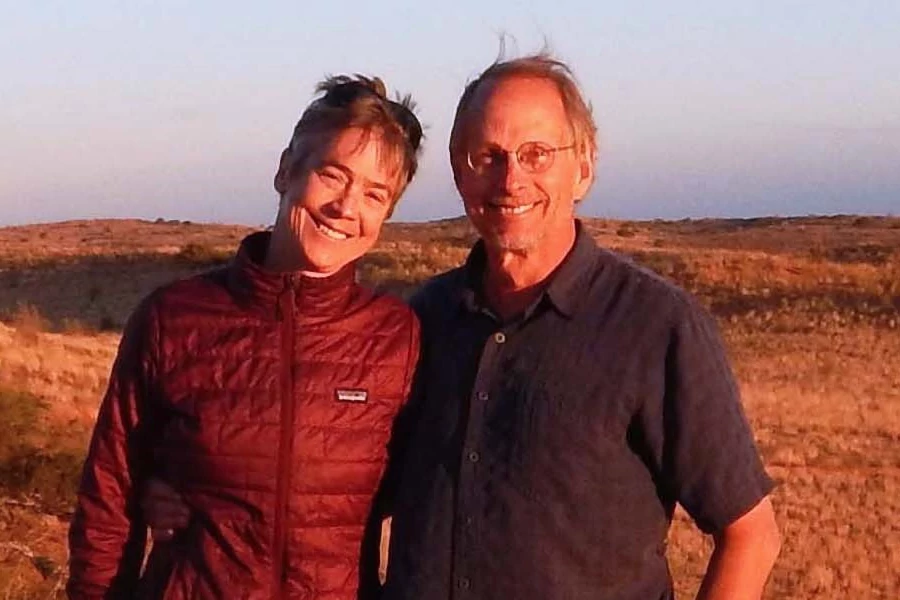
Grizzly Bear Ecologists Dr. David Mattson and Louisa Wilcox

Louisa Willcox fell in love with the wilds of Greater Yellowstone when she was 14 and has spent much of her life advocating for wildlife and wild places. She taught mountaineering for the National Outdoor Leadership School for nearly a decade and served as an early board member of the Wyoming Wilderness Association. She also wrote for High Country News, including articles about grizzly bears shortly after they were protected under the Endangered Species Act.
In the early 1980s, she served as Field Studies Director for the Teton Science School, teaching young people about natural history and the magic of the wilds around Jackson, Wyoming, while serving as a board member of the Jackson Hole Alliance for Responsible Planning.
During 1985-1995 she worked as Program Director for the Greater Yellowstone Coalition in Bozeman, Montana, where she organized and coordinated the efforts of 140 organizations and their members in protecting the Greater Yellowstone Ecosystem. There she honed her skills at developing comprehensive strategies that succeeded by working on multiple scales using grassroots organizing, education, communications, policy analysis, lobbying, coalition development, and public protest. Successes included protection of the Clarks Fork of the Yellowstone River under the Wild and Scenic Rivers Act; restoration of wolves to Yellowstone; preservation of ESA protections for Yellowstone's grizzly bears; prevention of projects that could have harmed Yellowstone's unique geothermal system; and halting a disastrous gold mine on the doorstep of Yellowstone Park.
From 1995-2003 she directed Wild Forever, a coalition of environmental groups working under auspices of the Sierra Club to protect grizzlies in the Northern Rockies. During this time Louisa also served on the founding Board of the Yellowstone to Yukon Initiative and The Wildlands Project.
From 2003 until retiring in 2013 Louisa worked as Senior Wildlife Advocate for Natural Resources Defense Council, where she and others led the successful fight to reverse the government's 2007 decision to remove ESA protections for Yellowstone's grizzly bears. She also worked to stop wolf delisting and the slaughter of buffalo on the Yellowstone Park's border -- both on-going battles. During this time, she became friends with Deidre Bainbridge, whose passion for bears matched her own.
In 2015 Louisa and her husband Dr. David Mattson started Grizzly Times, www.grizzlytimes.org, and a podcast, https://www.grizzlytimespodcast.org/, to provide a voice for grizzly bears and the wild. She has written extensively about the celebrity grizzly bear 399 and other well-known grizzlies of Jackson Hole.
Louisa has a BA from Williams College and a Masters of Forest Policy from the Yale School of Forestry and Environmental Studies (FES). In 2014 she received a lifetime achievement award from Yale FES.
David Mattson grew up in western South Dakota in an extended family of ranchers and farmers, among whom was a grandfather who had helped hunt down the last wolf in the state. David's rambles around his family's ranch in the Black Hills inculcated a deep and abiding love for wildlife and wildlands, as well as a dawning appreciation for the tragic losses of biodiversity that had been caused by European settlers during a startlingly brief 80-year period.
David went on to seek out wild places wherever he could find them, ending up in the Yellowstone ecosystem employed as a researcher with the Interagency Grizzly Bear Study Team between 1979 and 1993. During much of this period he held primary responsibility for field investigations that focused on grizzly bear diets, behaviors, and relations with humans. These studies yielded important discoveries about the exploitation of whitebark pine seeds, cutthroat trout, and army cutworm moths, and resulted in numerous scientific publications about the ecology of Yellowstone grizzly bears.
During 1994-2000 David not only pursued a doctoral degree focused on grizzly bear ecology, but also cultivated an interest in natural resources policy. This intellectual turn resulted in a long-standing relationship with the Yale School of Forestry & Environmental Studies which culminated in an appointment as Lecturer and Senior Visiting Scientist during 2006-2016 and a term as Visiting Scholar at the Massachusetts Institute of Technology during 2007-2008. His policy-oriented studies resulted in many publications, including a paper that he had the privilege of co-authoring with John Craighead.
After earning his Doctoral degree, David set up residence in Flagstaff, Arizona, as a researcher with the U.S. Geological Survey. His field studies in the Southwest during 2002-2013 focused on the ecology of mountain lions, eventually encompassing six different study areas in northern Arizona, southern Utah, and southeastern Nevada. During this period David also served as Western Field Director of the MIT-USGS Science Impact Collaborative and Leader of the Colorado Plateau Research Station.
After retiring in 2013, David moved to Montana and, with his wife Louisa Willcox, started advocating in earnest for protection of grizzly bears in the northern Rockies. These activities eventually led Louisa and David to establish Grizzly Times with the intent of providing a wide range of online information for grizzly bear advocates. David also developed the websites All Grizzly and Mostly Natural Grizzlies, both of which focus on the natural history of grizzlies globally and in the Northern Rockies. Since 2015 David has provided scientific support for a wide range of advocacy efforts, including litigation that successfully challenged the US Fish & Wildlife Service's 2018 attempt to remove ESA protections for Yellowstone's grizzly bears.
During recent years David has focused on spending quality time with Louisa and his dog Tashi, while advocating for the restoration of grizzlies in central Idaho and use of sound science in government decision-making.